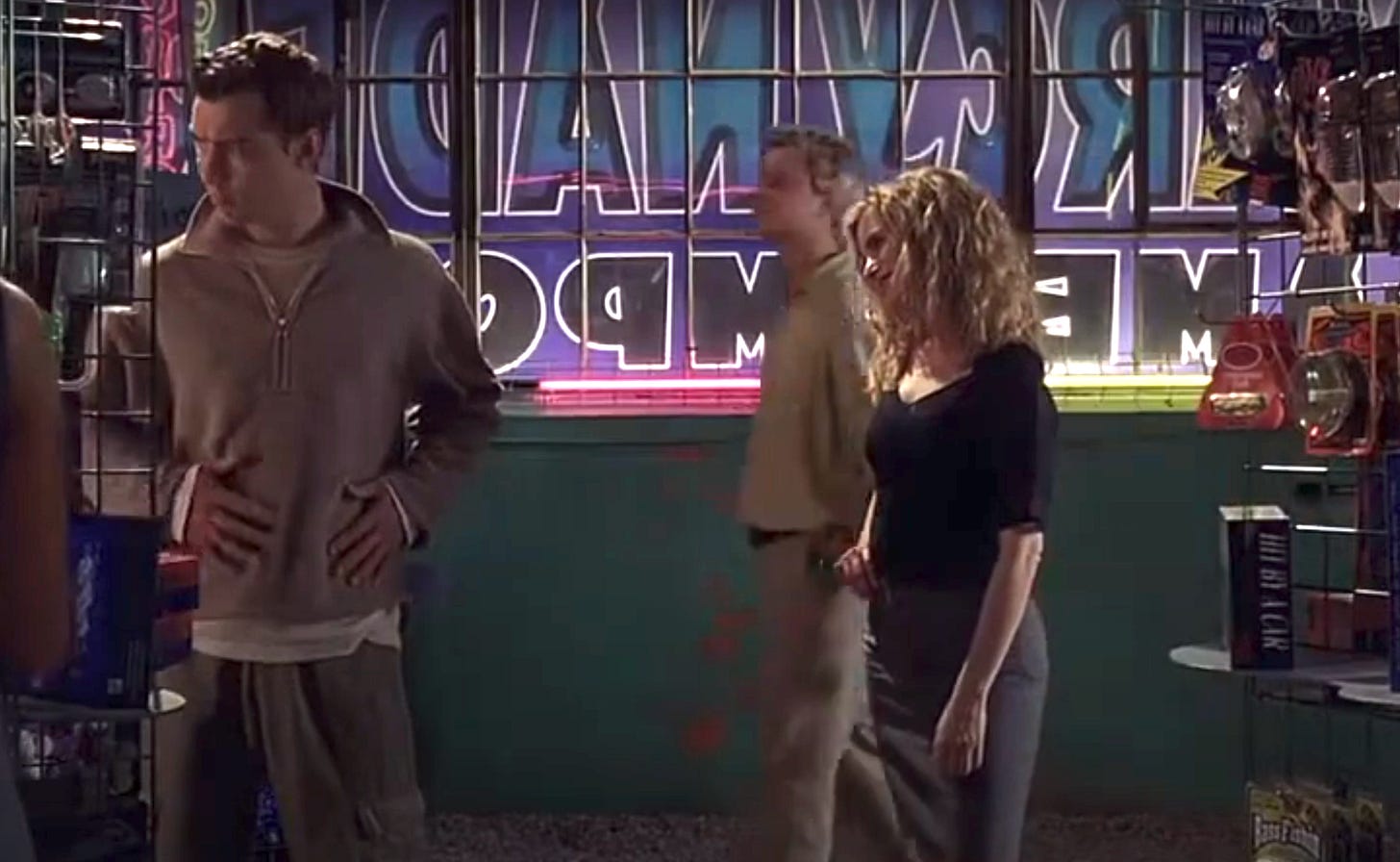The main impetus behind the TIMECODES film book series was a simple question: why do some films haunt us? Not haunt in a ghostly sense but in the recurrence sense. Films that we walk with for reasons that aren’t immediately clear or obvious. Something more than nostalgia, or quotable lines, something that you can’t quite put your finger on. Films that are memorable because they are not perfect, because their rough edges keep us thinking about them. For instance, I know why I like Mulholland Drive, and I could spell it out pretty clearly. But that’s not a movie that haunts me because it’s too great, it’s too monumental in my imagination, perfect and perfectly symmetrically structured and paced; Lynch’s film doesn’t need me to complete it because, perfect-circle like, it completes itself. Instead, I’m thinking of films that hang around the edges of our imagination, films that perhaps even go dormant in our minds for stretches only to reappear now and then in our thoughts, but for no obvious reasons.
Are there films like this for you? Films that you can’t shake but it’s not quite clear why? Films that you walk with because there is something about them that that doesn’t slot into the familiar?
That’s how eXistenZ is for me. Dutifully but not enthusiastically reviewed upon release and mildly recuperated since then, eXistenZ occupies a curious, liminal position in Cronenberg’s filmography. It’s commonplace now to rank 1999 as THE year in Hollywood filmmaking and maybe the noise of that year (eXistenZ was released the same weekend as as Alexander Payne’s Election) and unfortunate timing of coming out a few weeks after The Matrix doomed it as a solid but curious Cronenbergian footnote from the start. But it has always seemed to me to be among the most Cronenberg-like of Cronenberg films, alongside The Brood (1979) and Videodrome (1983). (There is the unfortunate “Are we still in the game?” last line, which feels like the “was it all a dream?” conceit that seems to be a pretty universally hated storytelling trope. Because so much of the movie trusted its audience to parse their way through its world, those explicative last words seem oddly out of place.) Here is one scene I can’t shake.
It involves the truly weird, affectless performance of Robert A. Silverman as D’Arcy Nader. “Welcome to Dorsey Nader's Game Emporium. I'm Dorsey Nader. Is there anything I can help you with?” Just look at him there (on the right), stuck in his game loop, or “caught in a small behavioural loop,” as the screenplay suggests! His head oddly tilted, his arm hanging there like it doesn’t know what to do or how to behave in loop mode. This scene itself—Allegra Geller’s (Jennifer Jason Leigh) odd, porny body language, those Argento red windows (and the feeling that there is nothing on the other side of those fake windows because there is nothing on the other side of those fake windows because this is a movie set depicting another sort of set: an incomplete game) the wooden crates with straw, the chipped paint (unfinished game-world) on the walls—is so wrong that it’s perfect. The impossible, expressionistic lighting, emanating from some unsourced place above them. The hand truck because of course in a back storage room that’s an object (a prop) you’d expect. Pikul (Jude Law) looks like a doll that’s been very carefully arranged; in fact, they all do.
Cronenberg has described Crash (1996) as conceptually violent rather than literally violent and I think eXistenZ is conceptually about gaming rather than literally about gaming. It’s the thin membrane between levels of reality that haunts and so disturbs, the membrane as a liminal space between: flesh/machine, organic/inorganic, internal/external, audience/film, screen/viewer, the given world/the imagined world. In other words, it’s about art itself.
Don't you think the world's greatest game artist ought to be punished for the most effective deforming of reality?
—Pikul (Jude Law) to the game designer Yevgeny Nourish (Don McKellar)
There are some fine pieces delving into the correspondences between Cronenberg and Jean Baudrillard, but what I wonder is if films like The Matrix and eXistenZ, having fitfully absorbed many of the moves of high theory, coincided with the demise of “theory” itself, which exists now as a set of defanged deconstructive tools rather than as a living, potentially threatening program?
In a short monologue from an earlier version of screenplay that didn’t make it into the final version, Pikul says, at the trout farm outside the Chinese Restaurant:
Reality is a fragile thing. Most people think that reality must of course be the most solid thing, but it isn't. Reality is threatened now more than ever. It is being eroded and it is washing away in the deforming storm of non-reality, which masquerades as reality, and eventually replaces it. Deformed and crippled and limping and hideous, threatening to engulf us all.
The screenplay notes that “A gazed look comes over Pikul” right before he speaks these lines, but in the filmed version his gazed look just hangs there for no apparent reason.
Absent the speech that emerges from this blank look the scene feels confused, as we don’t know what’s motivating Pikul’s unsteady demeanor. The trout farm scene has always felt, like the back storage room scene, special and uncanny. On the one hand it’s so beautifully shot and one of the few scenes taking place in the sunshine and maybe it’s the realistic, powerful rendering of the sunlit world itself—as opposed to the drab, monochrome, unfinished other parts of the game world. But this external glow is offset by Pikul’s obscure, internal workings whose source—he is preparing to speak his monologue (“the game made me do it” he says to Gellar in the screenplay, not the film)—is absent to us who are watching the film, unless we know there is a missing chunk of dialogue. The entire scene, which only lasts around a minute-and-a-half, feels like its own little universe, a complete film within the film.
Throughout the film, Pikul worries about the motivation for his actions: do they emanate from him, the human being plugged into the game, or from something artificial (some line of code) in the game itself?
It’s impossible that something like AI “humanizers” actually exist.
In a few years (months?), however, I’m sure it will feel as quaint as AOL Instant Messenger.
“Get human-like content in seconds,” because AI can do humans better than humans can do humans. For those of us who’ve always felt more than a little displaced among our own kind, for those of us for whom the Sheila Heti question How Should a Person Be? is not an ironic but rather a serious question, the Humanizer is very tempting indeed.
Can we please develop an injection or something that would actually humanize us? (If you happen to be a cosmic pessimist or antinatalist you might want to switch out humanize for dehumanize.) When he first transports into the game world, Pikul touches himself in wonderment and says “that was beautiful. I feel... just like me,” which gets at the dark heart of the film. What—or who—exactly is “me”?
Later, he suddenly panics when thinking about their other, real bodies (the ones supposedly not in the game world) which he describes almost as if they are children. “I mean, where are our real bodies? Are they all right? Are they hungry? What if there's danger?” At moments like this it feels like the film is really about the process of filmmaking, with the “game world” versions of Pikul and Allegra stand-ins for the characters that Jude Law and Jennifer Jason Leigh are, in fact playing. The entire constructed game world as a movie itself, with Allegra the auteur in the same way Cronenberg is. The more “real” the game world/movie looks and feels—the more its players/audience lose themselves in it—the better chance it will have of being a successful commodity/movie.
And in fact the game eXistenZ, like the movie eXistenZ hits all the right action/adventure/intrigue notes, with double agents, betrayals, violence, romance, chases, explosions. It might be that there is no “outside” to the game and that the characters are in the game from the very beginning to the very end with no exceptions, just varying narrative levels of the game, which brings us back to the Golden Days of Theory. Louis Althusser’s (just don’t tell your students he strangled his wife to death, or do tell them, or assume they already know) “Ideology and Ideological State Apparatuses” (1970) is the ultimate deterministic, pessimistic manifesto from that era.
Ideology represents the imaginary relationship of individuals to their real conditions of existence. —Louis Althusser
What seems to take place outside ideology (to be precise, in the street), in reality takes place in ideology. What really takes place in ideology seems therefore to take place outside it. That is why those who are in ideology believe themselves by definition outside ideology: one of the effects of ideology is the practical denegation of the ideological character of ideology by ideology: ideology never says, ‘I am ideological’. —L.A
Pikul’s most tender moment might very be that moment he touches himself in his attempt to determine whether he’s inside the game or outside the game. In a sense he’s always in the game; it doesn’t matter if he’s Pikul the human self or Pikul the game version self (while his human self slumbers on the bed) because throughout the entire movie he is Jude Law playing a part, whether it be the human part or the game-version part. As an actor, he practices his own version of a humanizer in attempt to make Pikul feel real to us as an audience.
Ah, Pikul!
Ah, humanity!










For me a couple films that live in that liminal space would be
9 & 1/2 Weeks (which I’ve been wrestling with lately) & Mysterious Skin & (for some reason Hellraiser 2 does also but that seems very specific to the instance when I saw and some event proceeding the viewing when I was too young to process what I’d experienced.) I’m sure there are more.